
views
Preparing for the Exam

Identify which exam you need to take. In order to study for a nursing school entrance exam, you need to know which test you will be taking. The most common nursing school entrance exams are: National League for Nursing Pre-Admission Exam (NLN PAX) Test of Essential Academic Skills (TEAS) Health Occupations Basic Entrance Test (HOBET)

Know the nuances of that exam. Nursing school entrance exams are different. Knowing the parameters of each test will allow you to focus on specific areas while studying. For example, the HOBET exam gauges your social skills and ability to cope with stress while the TEAS test is simply gauging your basic math, reading and science skills.

Acquire the necessary materials and support. You can purchase study materials from any reputable bookstore or online resource. Ask the academic advisor at your prospective school for any recommendations for study guides. Use these materials to make flash cards and notes and absorb as much about the test material as possible. Also, you can form study groups if you know other people who are preparing for the same test.

Study as much as possible before the exam. Nursing school entrance exams are content driven, which means that they will test what you already know or should know. Techniques that can be successful for studying content include memorization, using acronyms, and using associations. Another type of studying is "chunking," which is breaking a large amount of material down into smaller units instead of trying to absorb everything at once. Avoid cramming. Make sure you give yourself enough time to study. If you have already worked and volunteered in the field, you will likely already know a lot of the information, but don't use that as an excuse to wait to the last minute to study.

Take practice exams. We’ve all heard the phrase “practice makes perfect.” Find a practice test for the type of nursing school entrance exam you will be taking online, in your study guide or at a local community center or college. Taking this practice test can help you identify areas in which your performance was weak and fix it before taking the actual exam. Take as many different practice tests as you can, as they will cover different material. If you identify areas of weakness, spend additional time studying this material and seek out the help of a tutor.
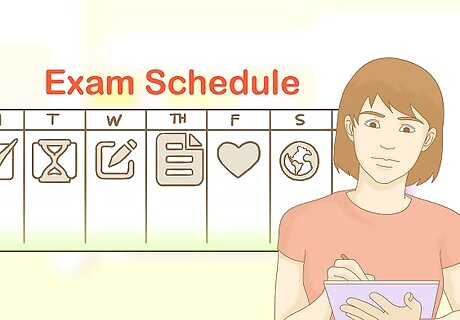
Schedule the exam. Arrange an exam date that will give you plenty of time to study, but will also allow you to submit your application materials, along with the test score, to your prospective school before the submission deadline. It is wise to check your calendar and make sure you do not have any scheduling conflicts on the day of your exam or in the days that immediately precede it. Preparation is a huge part of success on standardized tests and your will want to be sure you have the days leading up to exam free for study and preparation.
Taking the Exam
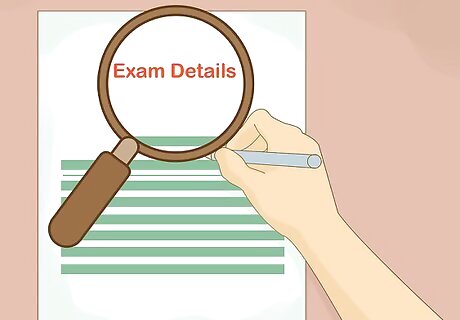
Know the details of your examination. Identify when, where, and in what format your nursing school entrance exam will be administered well before the exam date. Make sure you get a good night’s rest before the exam and leave yourself time for a final review of the materials.

Arrive early. Arrive at the testing site at least 30 minutes early on the day of your exam. Bring your picture ID and pencils, if necessary. Do not bring your cell phone, calculator, food, drinks, or any study materials into the exam room. Noise-canceling headphones may be issued at formalized testing centers, as there are often many people taking exams at the same time.

Have a section plan. As is the case with most standardized tests, nursing school entrance exams break down into various sections and the overall exam has a set time limit. Knowing this, plan to spend a pre-determined amount of time on each section and stick to it. Also, don’t forget to allow yourself some time to review your answers in each section before moving on.

Take the exam. The majority of these exams are comprised of multiple choice questions. Read and answer each question carefully. If you get caught up on a question, skip it and come back to it during the review period you allotted for yourself. Never leave questions unanswered. If you don’t know the answer, guess. You may get lucky and get some extra points. You may want to look into strategies for quickly answering multiple choice questions. For instance, first cross off any obviously wrong answers. Answers with absolute qualifiers like "always" or "never" are typically not the correct answer; however, relative qualifiers such as "generally" or "sometimes" are usually found in the correct answer.
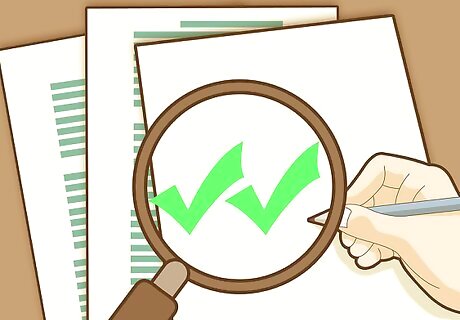
Double check your exam. It is wise to give your exam one last perusal before handing it in. You may catch an error or two when reading back over your exam or notice that you failed to answer a question here or there.
Deciding Which Test to Take
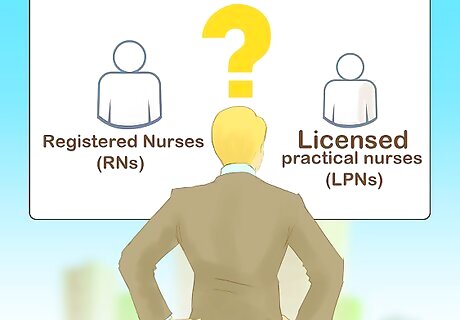
Decide on a career path. There are essentially two different types of nurses. Registered nurses (RNs) are expected to complete a two or three year degree, usually after obtaining a bachelor’s degree, are more often employed in hospitals and are expected to take on more important tasks that involve a greater degree of critical thinking and decision making. Licensed Practical Nurses (LPNs), also known as Licensed Vocational Nurses (LVNs), usually obtain a nursing certificate after about a year of nursing education. LPNs are more often employed in long term care facilities, filling administrative roles and overseeing the basics of patient care (changing bedpans, linens, IVs, etc…). In settings where LPNs and RNs work together, RNs outrank LPNs and undertake more intensive and critical duties. Most nursing school entrance exams offer separate tests for LPN and RN programs.

Select nursing schools. Once you have chosen between becoming a RN or LPN, choose one or more nursing schools that can provide you with your desired degree or certificate through the completion of their program. Make sure that the school you choose is an accredited school. The school will specify which entrance exam is necessary to apply to the nursing program you want.

Learn the specifics of the test. Find out the specifics of the test you will take so that you know how to study for it and what material to focus on. The exams typically take between 2 and 3.5 hours to complete. The exams may be administered on a computer or using pencil and paper. You will find out your scores immediately after completing the computerized version of the test.
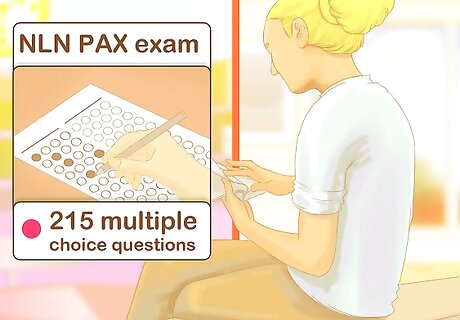
Prepare for the NLN PAX exam. The NLN PAX exam consists of about 160 multiple choice questions. The questions on the NLN PAX exam break down into verbal skills, math and science sections. Some of the questions on this exam will not be graded, as they are simply used to gauge responses for future testing. However, you won’t know which questions will or will not be graded at the time of the exam, so answer each one to the best of your ability. You can’t use a calculator for this exam. The exam takes about 3 hours to complete and costs about $60 to $100. You will not be allowed to retake this exam for six months after the initial testing date.
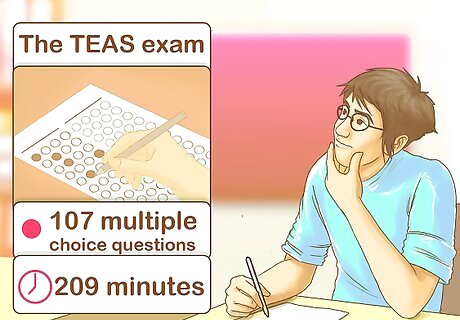
Prepare for the TEAS exam. The TEAS exam, as the name suggests, is simply a test of basic knowledge that you should have learned in high school. This exam breaks down to English, reading skills, science and math sections. The TEAS exam contains 170 multiple choice questions that must be answered in 209 minutes. You will not be allowed to use a calculator. Fees for this exam can range between $20 and $60.
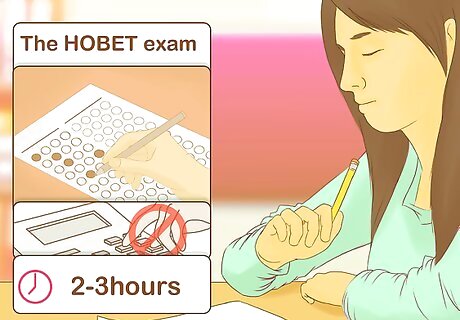
Prepare for the HOBET exam. The HOBET exam is administered by the same company that operates the TEAS exam and tests candidates for the same generalized knowledge, but also gauges an individual’s potential to work in healthcare. The HOBET exam gauges basic math skills, reading comprehension skills, test taking skills, critical thinking skills, social interactions, your ability to cope with stressful situations and your learning style. The math section requires knowledge of algebra, fractions, percentages, statistics and other math functions. The reading comprehension section tests to ensure you have attained a tenth-grade reading level. The test takes between two to three hours to complete and you will not be allowed to use a calculator. While you can take the HOBET exam multiple times, many schools limit the number of tests for its candidates, citing the belief that if you fail to achieve success in your first few tries, you are probably not an ideal candidate for healthcare work. The fee for this exam varies by school.

Know where the exam is offered. Find out where you can take your nursing school entrance exam in your area and how to register. Be aware that there is a fee for a nursing school entrance exam. This is all information that you can get from your prospective school or from websites maintained by the exams’ administrators. Give yourself enough time to study before your registered test date.
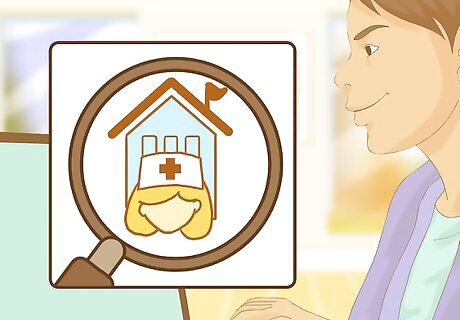
Know how your test will be weighted. Do some research about the nursing program you intend to apply to. Some schools weigh your grade history and personal history more heavily than your entrance exam, while others consider your exam scores to be more important.














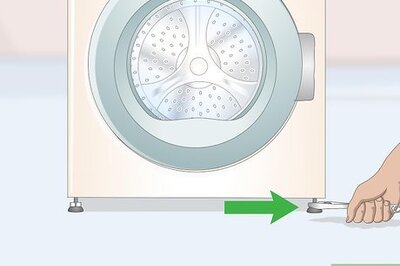



Comments
0 comment